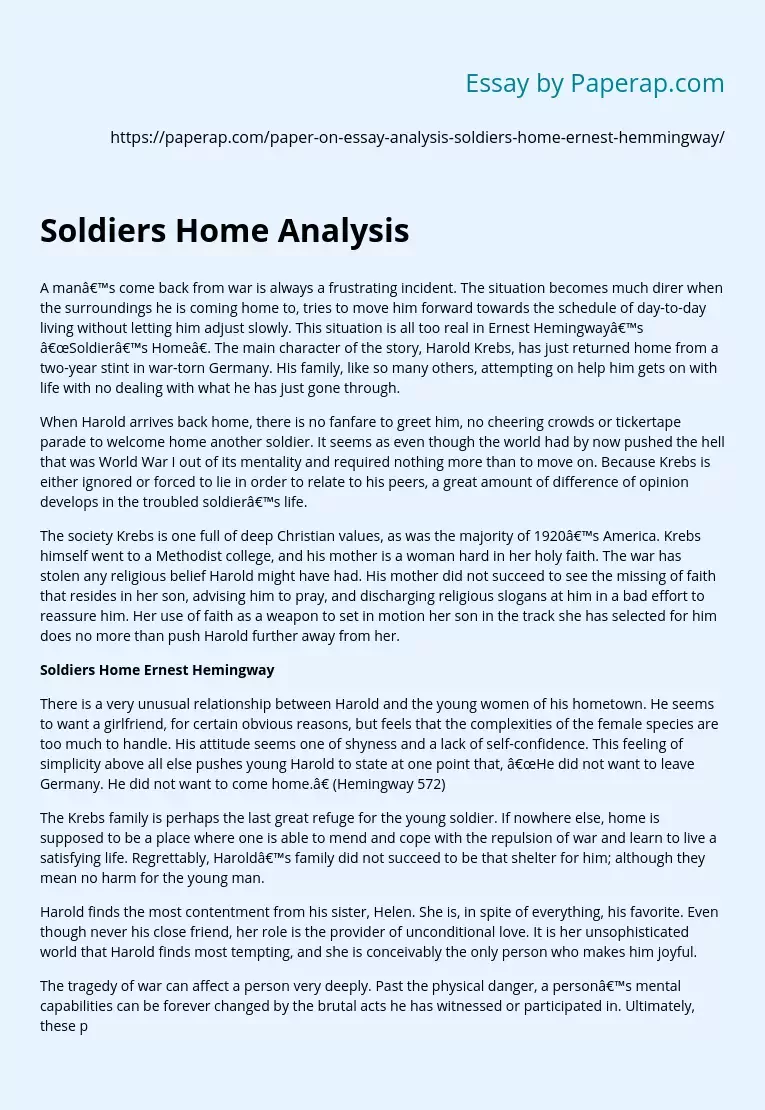Soldiers Home Analysis
A man’s come back from war is always a frustrating incident. The situation becomes much direr when the surroundings he is coming home to, tries to move him forward towards the schedule of day-to-day living without letting him adjust slowly. This situation is all too real in Ernest Hemingway’s “Soldier’s Home”. The main character of the story, Harold Krebs, has just returned home from a two-year stint in war-torn Germany. His family, like so many others, attempting on help him gets on with life with no dealing with what he has just gone through.
When Harold arrives back home, there is no fanfare to greet him, no cheering crowds or tickertape parade to welcome home another soldier. It seems as even though the world had by now pushed the hell that was World War I out of its mentality and required nothing more than to move on. Because Krebs is either ignored or forced to lie in order to relate to his peers, a great amount of difference of opinion develops in the troubled soldier’s life.
The society Krebs is one full of deep Christian values, as was the majority of 1920’s America. Krebs himself went to a Methodist college, and his mother is a woman hard in her holy faith. The war has stolen any religious belief Harold might have had. His mother did not succeed to see the missing of faith that resides in her son, advising him to pray, and discharging religious slogans at him in a bad effort to reassure him.
Her use of faith as a weapon to set in motion her son in the track she has selected for him does no more than push Harold further away from her.
Soldiers Home Ernest Hemingway
There is a very unusual relationship between Harold and the young women of his hometown. He seems to want a girlfriend, for certain obvious reasons, but feels that the complexities of the female species are too much to handle. His attitude seems one of shyness and a lack of self-confidence. This feeling of simplicity above all else pushes young Harold to state at one point that, “He did not want to leave Germany. He did not want to come home.” (Hemingway 572)
The Krebs family is perhaps the last great refuge for the young soldier. If nowhere else, home is supposed to be a place where one is able to mend and cope with the repulsion of war and learn to live a satisfying life. Regrettably, Harold’s family did not succeed to be that shelter for him; although they mean no harm for the young man.
Harold finds the most contentment from his sister, Helen. She is, in spite of everything, his favorite. Even though never his close friend, her role is the provider of unconditional love. It is her unsophisticated world that Harold finds most tempting, and she is conceivably the only person who makes him joyful.
The tragedy of war can affect a person very deeply. Past the physical danger, a person’s mental capabilities can be forever changed by the brutal acts he has witnessed or participated in. Ultimately, these psychological woes will restore to health if they are dealt with in a suitable style and given a correct amount of time. However, when a soldier’s return is met with disbelief and an insensible public grows weary of hearing about his experiences, those scars will not heal. When a person’s faith in his religion has vanished and is not met with understanding. If Harold cannot take ease in being with his own family, let alone any of the local girls. He cannot be anticipated to join the flow of day-to-day life. Although the story of Harold Krebs is one of fiction, it can be looked upon as a guide to how a person’s experiences after war can be just as disastrous.
Soldiers Home Analysis. (2019, Dec 05). Retrieved from https://paperap.com/paper-on-essay-analysis-soldiers-home-ernest-hemmingway/

